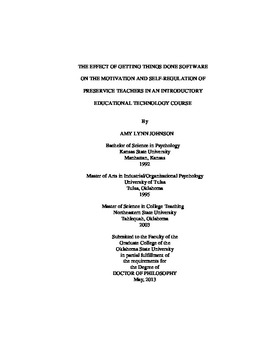| dc.contributor.advisor | Lamphere-Jordan, Patricia M. | |
| dc.contributor.author | Johnson, Amy Lynn | |
| dc.date.accessioned | 2014-09-24T14:16:32Z | |
| dc.date.available | 2014-09-24T14:16:32Z | |
| dc.date.issued | 2013-05 | |
| dc.identifier.uri | https://hdl.handle.net/11244/10969 | |
| dc.description.abstract | The purpose of this study was to investigate the effect of Getting Things Done TM (GTD) software on the motivation and self-regulation of pre-service teachers in an introductory Educational Technology course. Getting Things Done TM software has the potential to provide pre-service teachers with a positive influence on their personal growth in relation to their accomplishments in the course. This dissertation attempts to integrate an examination of motivation and self-regulation for pre-service teachers with the use of Getting Things Done TM software. The study was a concurrent mixed methods study, employing both quantitative and qualitative measures, to determine and ascertain the differences in motivation and self-regulation between comparison groups. Comparison groups consisted of eight intact sections of the Educational Technology course, randomly divided into equal numbers of experimental and control groups. The Motivated Strategies for Learning Questionnaire (MSLQ) and a researcher developed, Likert-type scale, were utilized for the pre- and post-test component of the study. Additional qualitative data was collected through interviews with eight randomly selected participants from the experimental groups at the end of the study. Paired sample t-tests, independent samples t-tests, and Pearson bivariate correlations were conducted on the quantitative data. The qualitative interviews were transcribed and analyzed for themes. Significant results were discovered in both the experimental control groups for the MSLQ subscales and the Likert-type data. As a result, alternative causes for significance were considered. The number of significant results in both groups point to unexpected consequences via an unintentional cause. It is believed that there were statistically significant changes in both groups because course instructors for the experimental groups and the control groups modeled the components of GTD via their use of the online course platform, Desire2Learn (D2L), for calendaring, reminders, and course materials, which closely mimicked the components of the GTD software for all of the classes. Therefore, due to course structure, all students were provided with information and tools to stay connected to and on top of course material via the online course platform and were not forced to seek out alternative methods to stay organized. | |
| dc.format | application/pdf | |
| dc.language | en_US | |
| dc.rights | Copyright is held by the author who has granted the Oklahoma State University Library the non-exclusive right to share this material in its institutional repository. Contact Digital Library Services at lib-dls@okstate.edu or 405-744-9161 for the permission policy on the use, reproduction or distribution of this material. | |
| dc.title | Effect of getting things done software on the motivation and self-regulation of preservice teachers in an introductory educational technology course | |
| dc.contributor.committeeMember | Curry, John H. | |
| dc.contributor.committeeMember | Jordan, Jerry | |
| dc.contributor.committeeMember | Harris, Edward L. | |
| osu.filename | Johnson_okstate_0664D_12727.pdf | |
| osu.accesstype | Open Access | |
| dc.type.genre | Dissertation | |
| dc.type.material | Text | |
| thesis.degree.discipline | Education | |
| thesis.degree.grantor | Oklahoma State University | |
